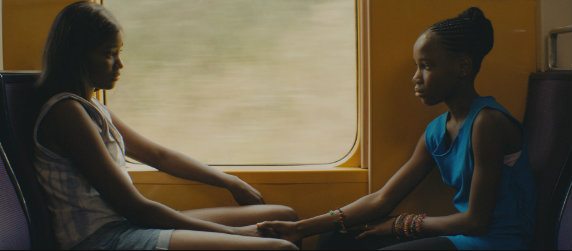Girlhood
Directed by: Celine Sciamma
Starring: Karidja Toure, Assa Sylla, Lindsay Karamoh, Marietou Toure
Run time: 112mins
Country: France
The question of whether our identity is innate or socially constructed has been around for a very long time, and is thrillingly interrogated in Girlhood, the tale of a young black girl growing up in the Paris projects. The French have always been obsessed with this question, dating back to the naturalistic novels of Balzac and Zola, and Truffaut’s Balzac-inspired The 400 Blows. Girlhood follows well in this tradition, culminating in a final shot reminiscent of Rastignac descending upon Paris at the end of Le Peré Goriot. The film unflinchingly asks us what options does a girl in this situation have, when her school system doesn’t believe in her, her brother is abusive, and the only positions seemingly available for older black women in her town are as prostitutes, drug dealers, or cleaners.
The film feels extremely political in its critique of Paris’ failed attempt at social housing, and the inevitably patriarchal nature of the projects that arise as a result. What makes it highly artistic is the way these criticisms arise naturally from the narrative. Marieme’s (Karidja Touré) – known as Vic among her friends – life is followed episodically, with long sequenced shots, allowing the audience to soak into her life as the narrative slowly progresses. This is Touré’s first role, and along with the other non-professional actors, she perfectly embodies the role. After being told she can’t go to high school she joins a bande de filles (the original French title) and they – like the gang in La Haine – go on a trip to central Paris. The gang work as her social support group, and the film makes a lot out of their moments together hanging out, talking and hugging, playing mini-golf and even getting into fights with rival gangs. Girls have to be strong here to survive, not to show weakness in front of others, and not sleep around unless they get branded a “slut” – a ridiculously unfair double standard. It becomes a society where gender performance is one of survival, and not simply a means of expression. However, girls are trapped by the hypocrisy of the patriarchy, where if they act too “feminine” they might get bullied and sexually assaulted by men, but if they act too “masculine” they get ridiculed by their fellow girls, and shunned by boyfriends – even the well-meaning love interest of Vic says the wrong things despite meaning well. They are trapped by social structures, and the only way to get on seems to be getting out – which is seemingly impossible due to economic reasons.
Sciamma – like her contemporary filmmaker Xavier Dolan who also inquires about gender constructs – balances her well-honed naturalism with heavily-stylised music video-style scenes. One scene stands out as the centerpiece of the film. Vic and her friends – having scraped enough money for a hotel room, and wearing shoplifted dresses – dance and sing to Rihanna’s “Diamonds”. I never really highly rated the song before (although I did like the Kanye remix) but in this context the effect was immensely powerful, watching these girls enjoy themselves and express their black femininity away from any judgmental eyes. It’s a fine line between corny dance scene and genuine emotion, but this scene feels instantly iconic. Other auteuristic touches include a black-out accompanied by pulsating synths at pivotal transitions in the film, and an obsession with clothing and hair-styles, making however the girls look at a particular time relate to their situation.
Sciamma – like her contemporary filmmaker Xavier Dolan who also inquires about gender constructs – balances her well-honed naturalism with heavily-stylised music video-style scenes.
Despite being engaging throughout, it does drag a little towards the end and moves a little too much into the traditional “hood” narratives it worked so well previously to avoid. Nevertheless, it’s a highly exciting film, both for its emotional impact, and it’s highly intellectual approach, probing so many great questions about gender and racial identity. I eagerly await the think-pieces it will inspire.
Images: Optimum Releases


Comments